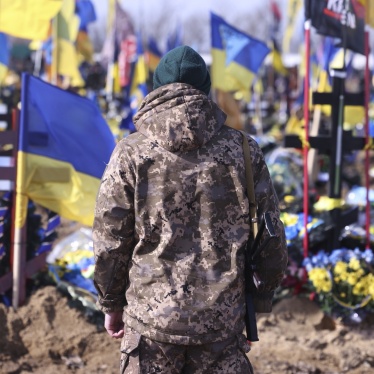(Geneva) - Nepal’s draft bill for a proposed Truth and Reconciliation Commission threatens to deny victims of the decade-long conflict their rights to truth, justice and reparation, Human Rights Watch and the International Commission of Jurists said today. The bill’s provisions on issues like amnesty and the commission’s independence from the government do not meet international legal standards.
The draft Truth and Reconciliation Commission bill of 2007 proposes the establishment of a commission with a mandate to investigate gross violations of human rights and crimes against humanity committed during the armed conflict that took place between government forces and the Communist Party of Nepal (Maoist) between 1996 and 2006. During the conflict, more than 12,000 cases of people killed were documented. Between 2000 and 2007 the National Human Rights Commission of Nepal received over 2,000 cases of enforced disappearances allegedly committed by government forces and also Maoist rebels.
The draft bill, however, is seriously flawed, Human Rights Watch and the International Commission of Jurists said. The bill fails to reflect the international standards adopted in 2005 by the United Nations on the right to a remedy and reparation for victims of gross violations of international human rights law and serious violations of international humanitarian law. These standards, known as the UN Basic Principles and Guidelines on the Right to a Remedy and Reparation for Victims of Gross Violations of International Human Rights, are based on international legal obligations, including Nepal’s specific treaty obligations.
The commission’s proposed mandate would not address serious violations of international humanitarian law. The draft bill also fails to clarify that the terms “gross violation of human rights” and “crimes against humanity” must be defined and applied in a manner that meets international standards.
In the draft bill, amnesties could be granted even for gross human rights violations if these acts had a political motivation, if the perpetrator made an application indicating regret, or if victims and perpetrators agree to a reconciliation process. Such a mechanism could result in protection from criminal prosecution for even the gravest of crimes.
“Thousands of Nepalis were killed or forcibly disappeared in the civil war, and their families have rights to truth, justice and reparation,” said Sophie Richardson, Asia advocacy director of Human Rights Watch. “But instead of delivering truth and justice, this draft bill could be used to let perpetrators off the hook.”
While the proposed draft states that amnesty will not be provided to any person involved in “murder committed after taking under control or carried out in an inhuman manner; inhuman and cruel torture; rape,” the vagueness of these terms creates leeway for amnesties for those responsible for murder or torture that the commission defines as not inhuman or cruel. Clearly defined terminology that is internationally accepted, such as “torture and other cruel, inhuman or degrading treatment or punishment,” should be used.
Under the draft bill, the Truth and Reconciliation Commission could not even consider any case already decided or being decided before a court in accordance with existing laws. The bill excludes from the commission’s mandate all cases of crimes under international law and other human rights violations in respect of which victims and their families had previously sought a remedy before the courts, whether or not an effective remedy was obtained. Protection against double jeopardy is crucial, but the overbroad scope of exclusion could result in denying justice to those who have already been denied it once in the court system.
The commission should have the power to express views on the need for judicial review of cases heard in the courts. Nepal has an obligation under international law to ensure measures adopted do not lead to impunity or constitute an impediment to bringing perpetrators to justice.
The international standards adopted by the United Nations provide that reparations should include: compensation, rehabilitation, restitution, non-repetition and satisfaction. Article 26 of the draft bill fails to provide satisfaction. This should include public apologies, public disclosure of the truth, identification and burial of bodies of victims in accordance with the wishes of the victims, commemorations and tributes. It should also include judicial and administrative sanctions against the persons liable for the violation. Article 23(3) allows reparations to be made available to facilitate reconciliation, following consultations with the perpetrator rather than the victim. In each area, the authorities should ensure that the victims’ interests are protected.
Human Rights Watch and the International Commission of Jurists are concerned that the Truth and Reconciliation Commission does not enjoy clear operational independence from the government. Though the draft bill states the commission will operate in an independent and impartial manner, it contains numerous provisions which could undermine these principles.
Provisions on the appointment process, staffing and funding of the commission reflect direct or indirect government involvement. For instance, the process of nominating members is led by a body open to political influence and does not allow for sufficient consultation with civil society. Under the bill, the seven members of the commission would be appointed by the government, after receiving recommendations from a three-member committee constituted by the government with the consensus of political parties represented in parliament.
“The truth commission must be independent and transparent,” said Richardson. “The government should not ignore the views of victims, particularly in regions hit hard by the conflict.”
The government’s consultation with Nepalese civil society and victims has been insufficient on all issues including the establishment, mandate and powers of the commission. While the government has now committed to consult with civil society, including at the regional level, it should ensure that consultations on the commission are carried out in an open manner not using the draft bill as the only starting point for discussions. It is vital that discussions on the commission take place at the district level, particularly in areas greatly affected by the conflict.
“The commission’s legitimacy will also depend on the popular support it has from the people of Nepal, particularly the victims of the conflict,” said Wilder Tayler, deputy secretary-general at the International Commission of Jurists.
Human Rights Watch and the International Commission of Jurists called on the government of Nepal to:
- Ensure open and meaningful consultation is carried out with civil society and victims in the drafting process;
- Clarify that the terms “gross violation of human rights” and “crimes against humanity” are to be applied in accordance with international legal practice to ensure that any serious infringement of Nepal’s international human rights obligations is duly investigated and that no acts that adversely affected civilians during the conflict are left out of the scope of the bill;
- Introduce transparent appointment procedures, such as public hearings of the commissioners to ensure the independence and impartiality of the commission;
- Respect international human rights standards with respect to granting of amnesties for serious crimes. Section 25(2) of the bill must be amended to exclude recommendations for amnesty for crimes under international law such as crimes against humanity, war crimes, and gross human rights violations in general such as extrajudicial killings, enforced disappearances and torture;
- Guarantee reparation to all victims of human rights violations;
- Ensure that the preamble, which incorporates the objectives of the commission, should include objectives that fulfill Nepal’s treaty obligations. These would include provisions to bring justice to victims and establish a historical and accurate record of incidents.





